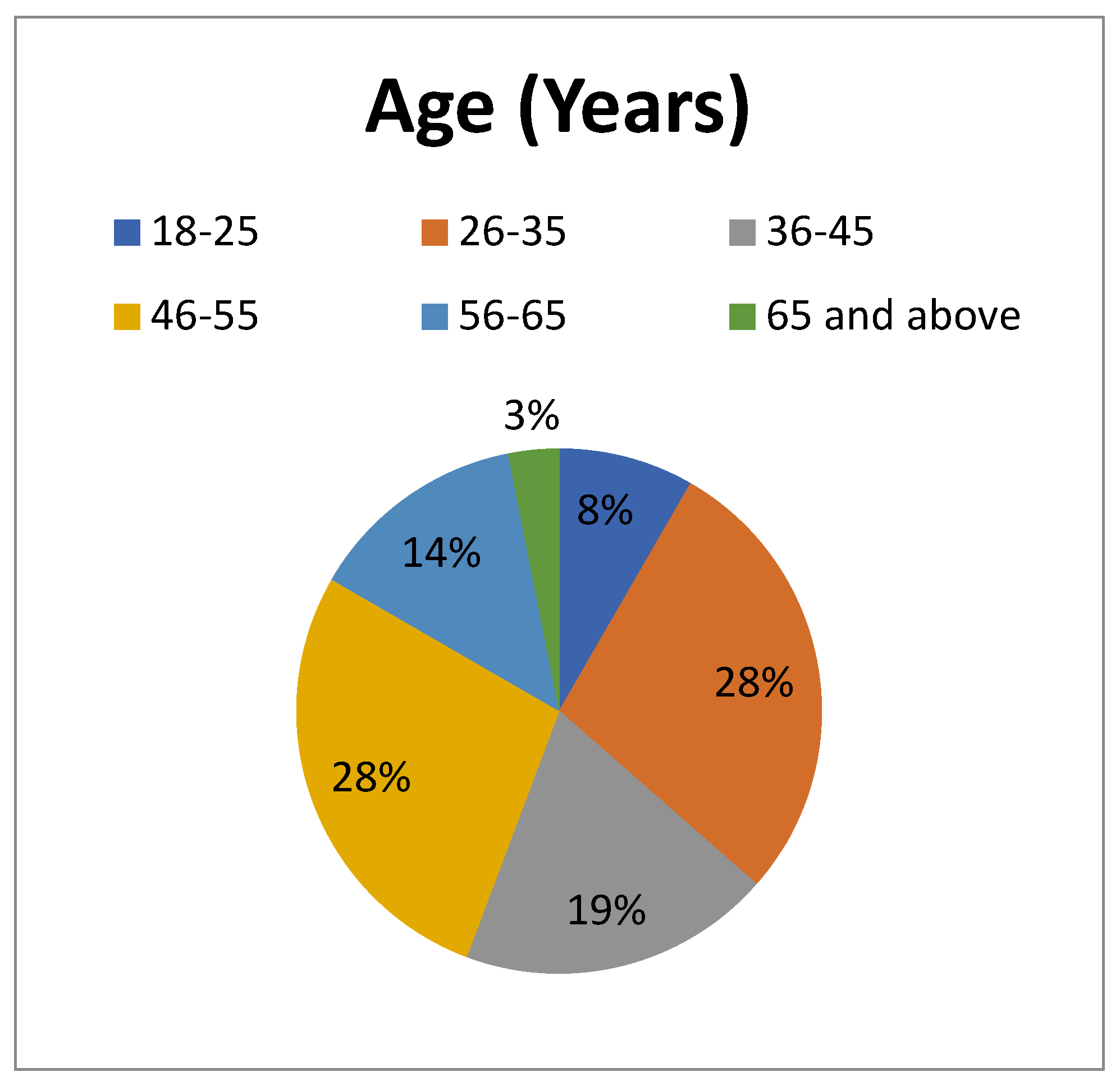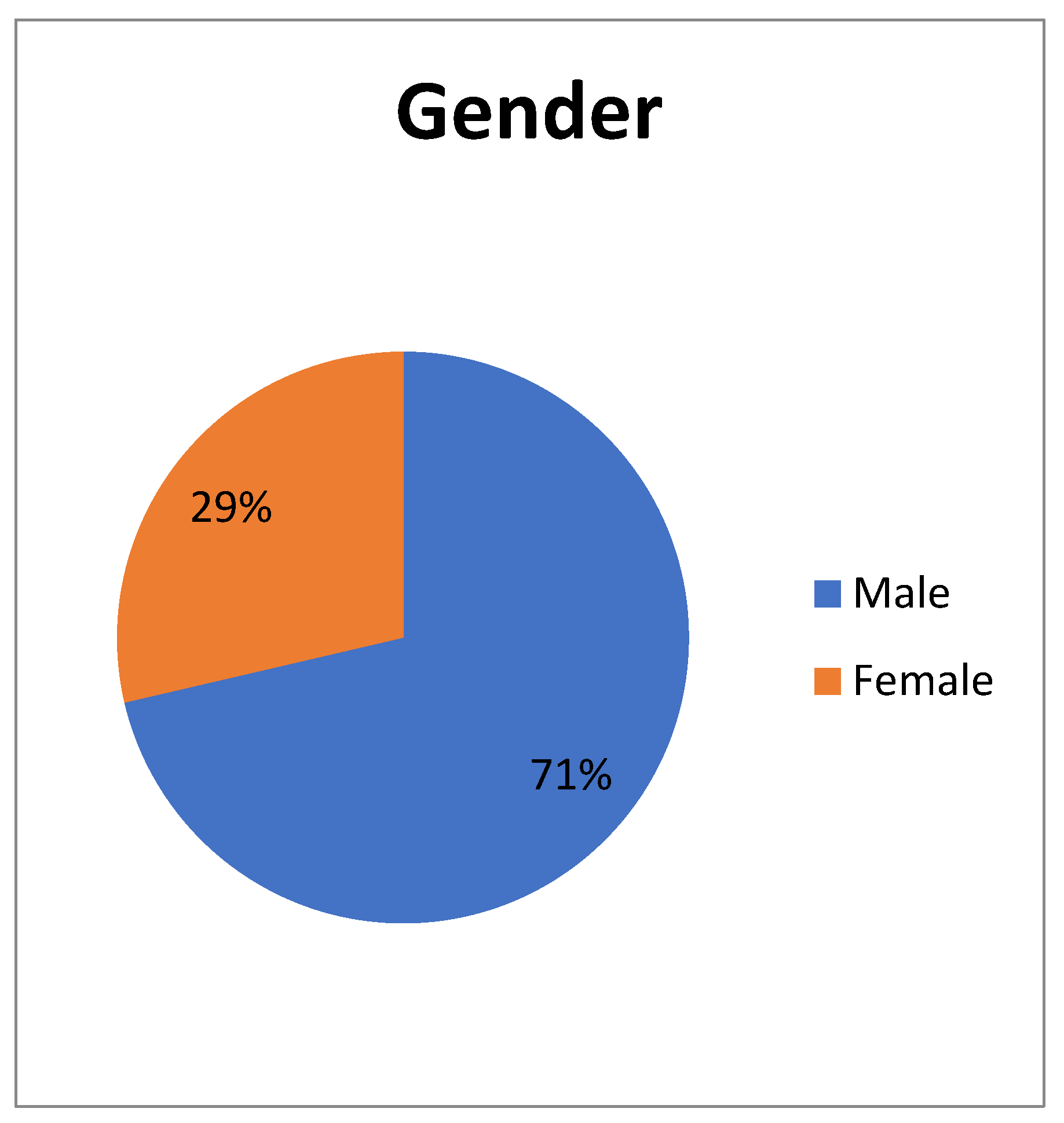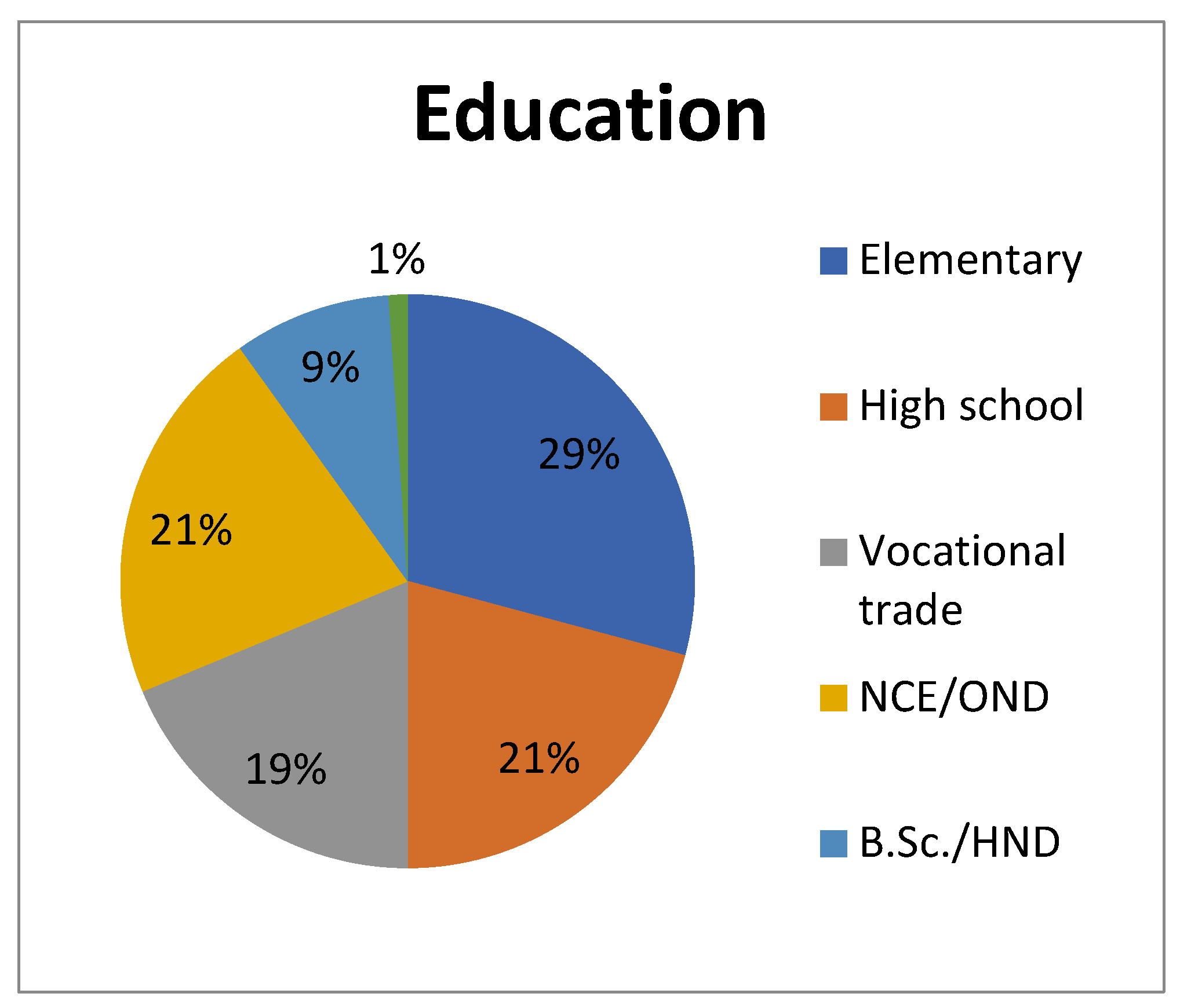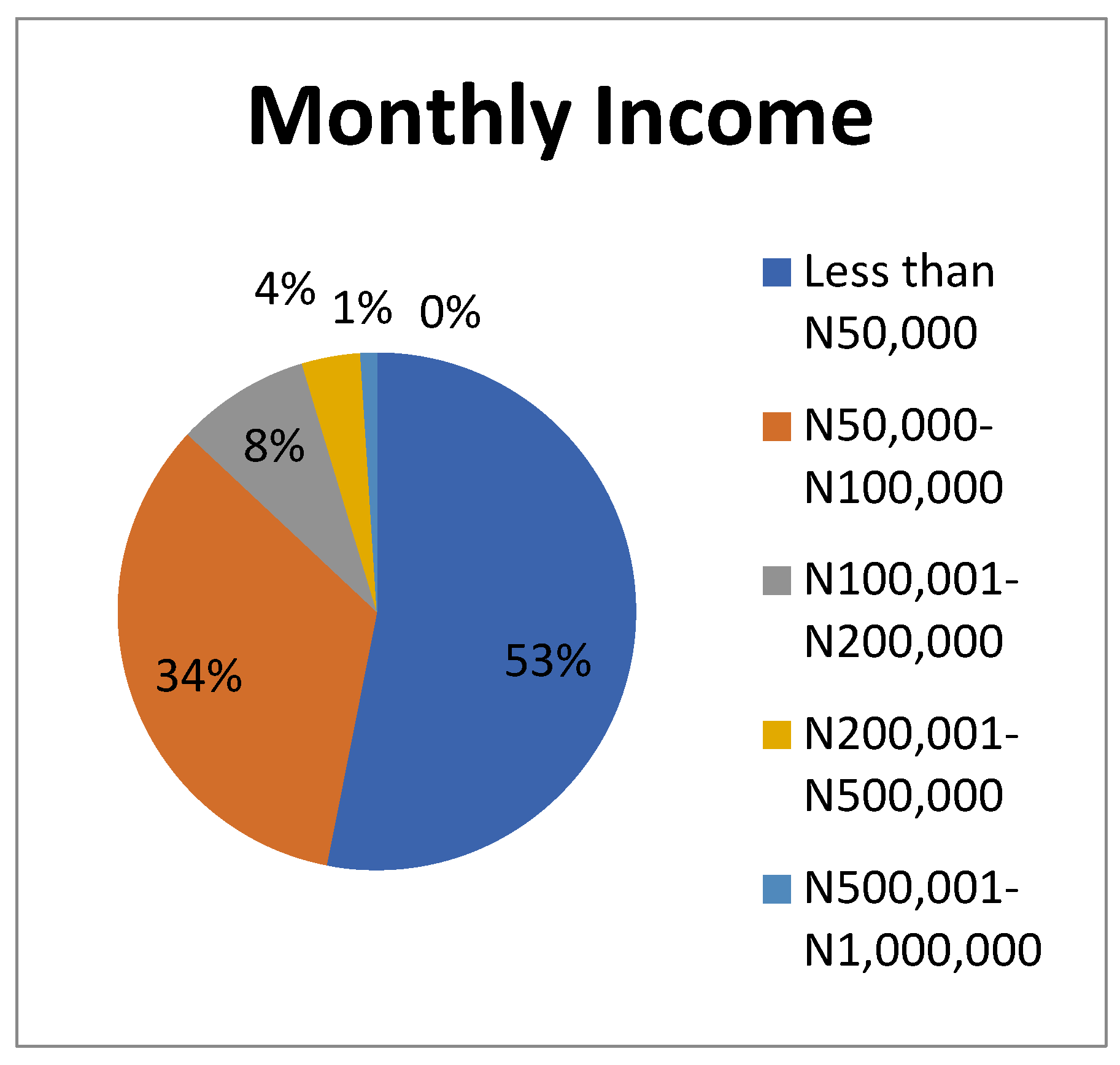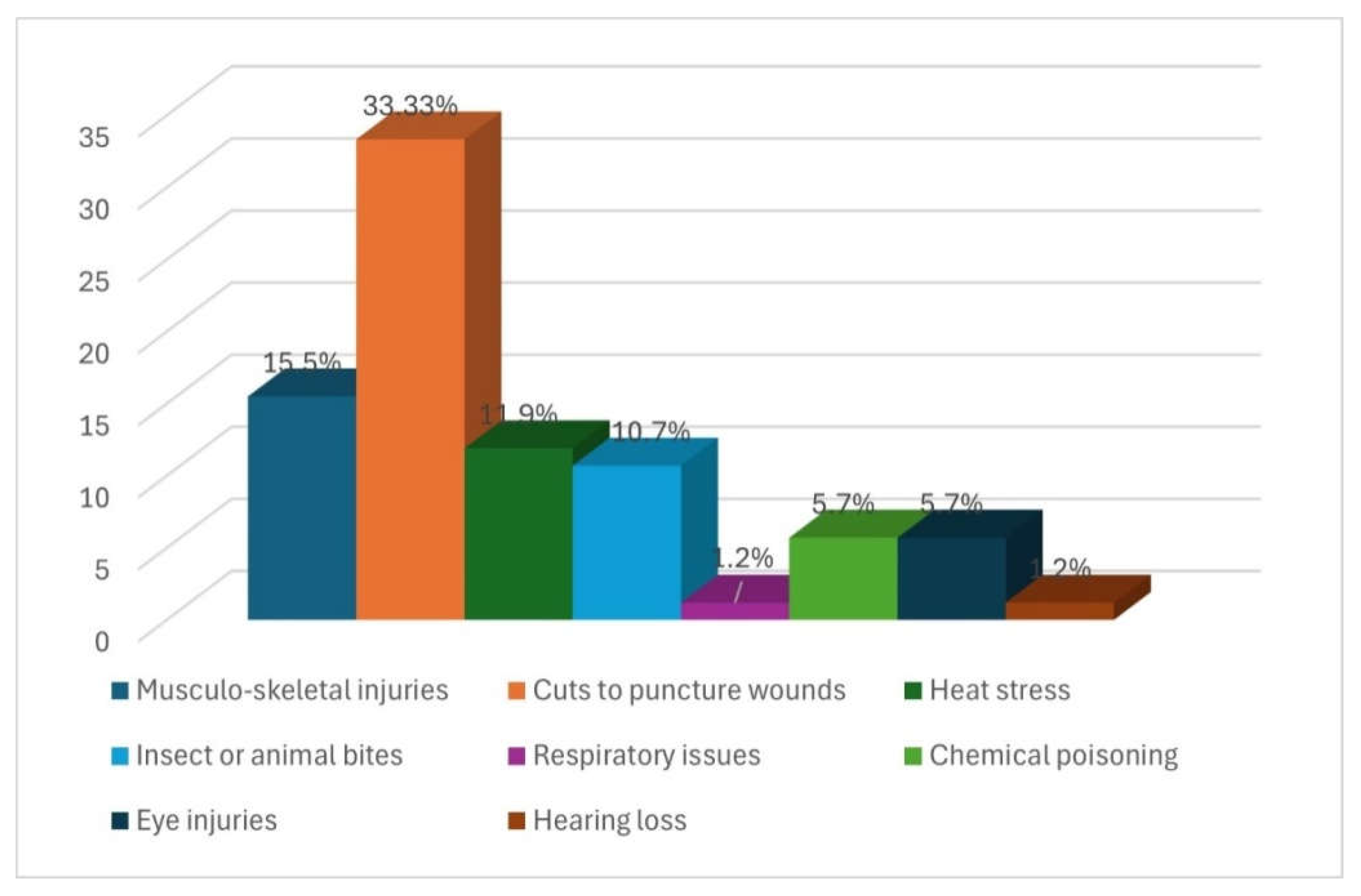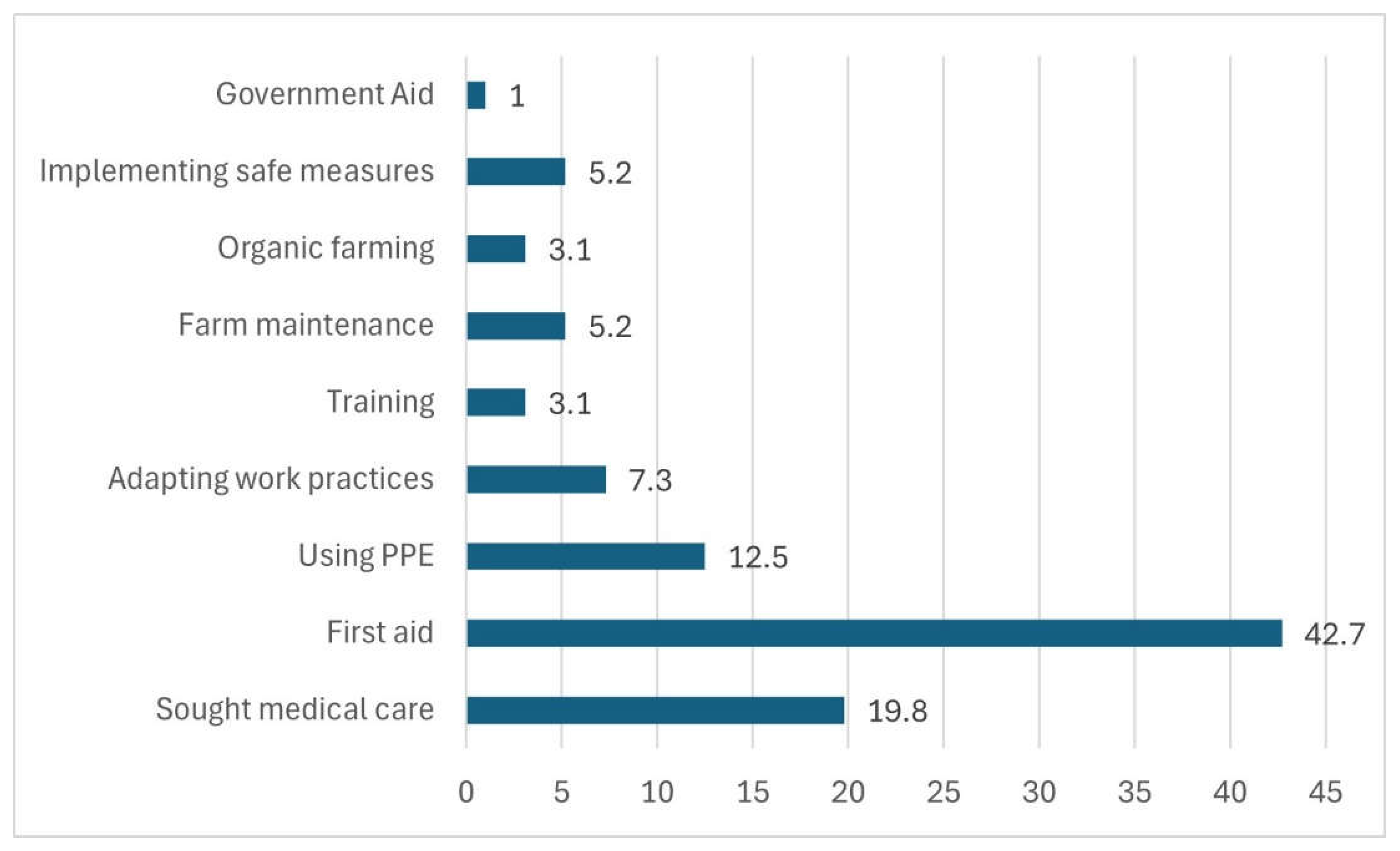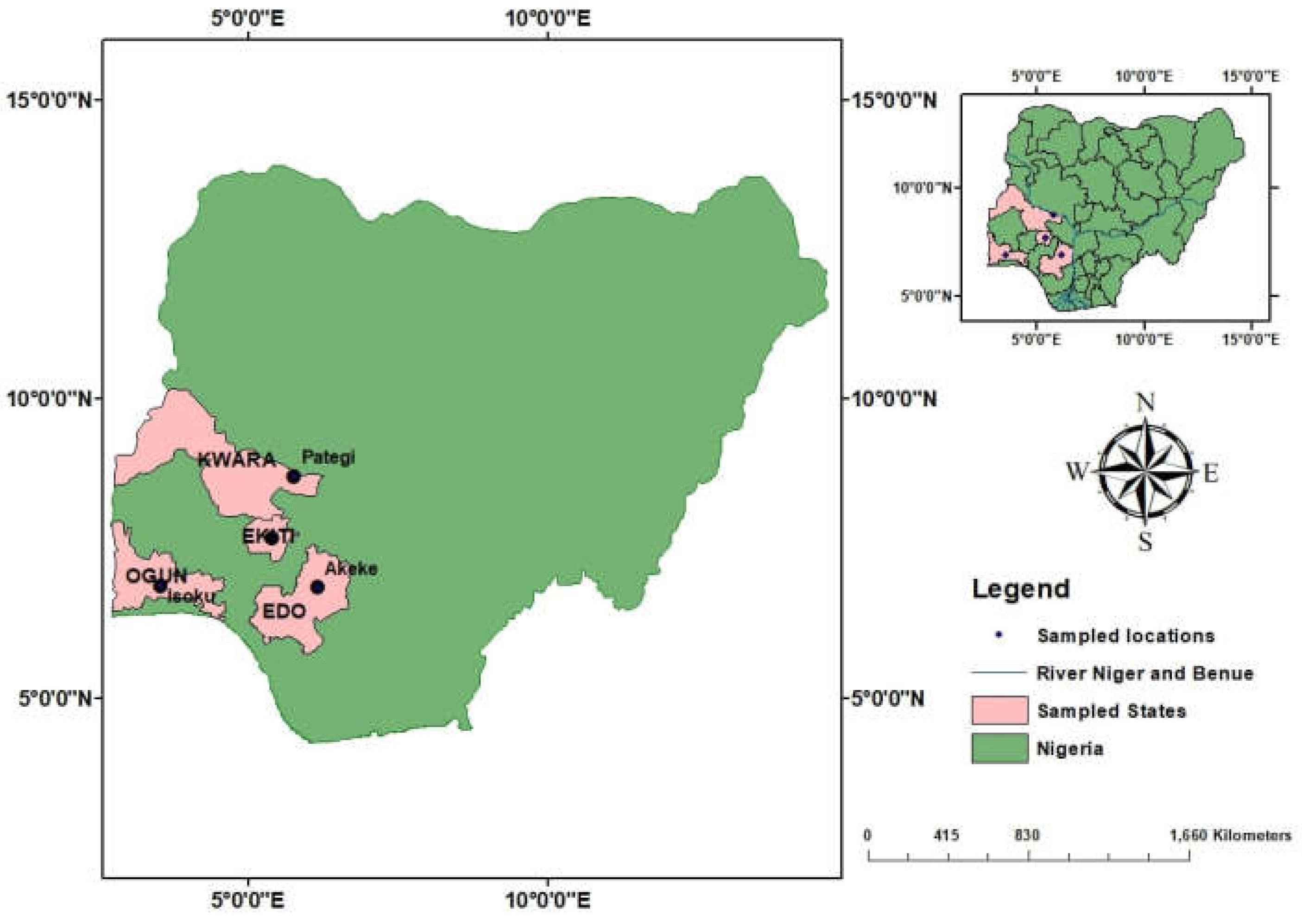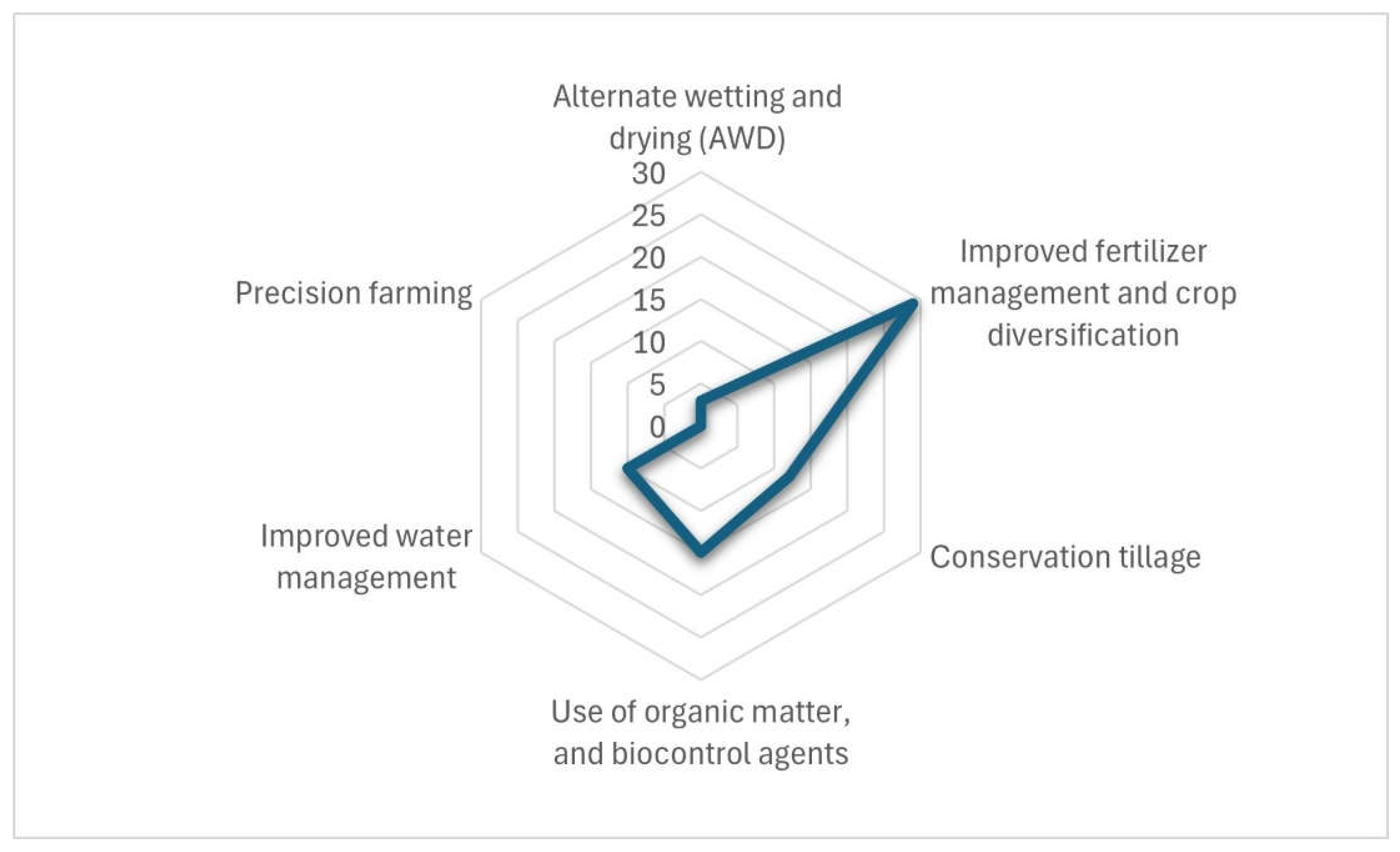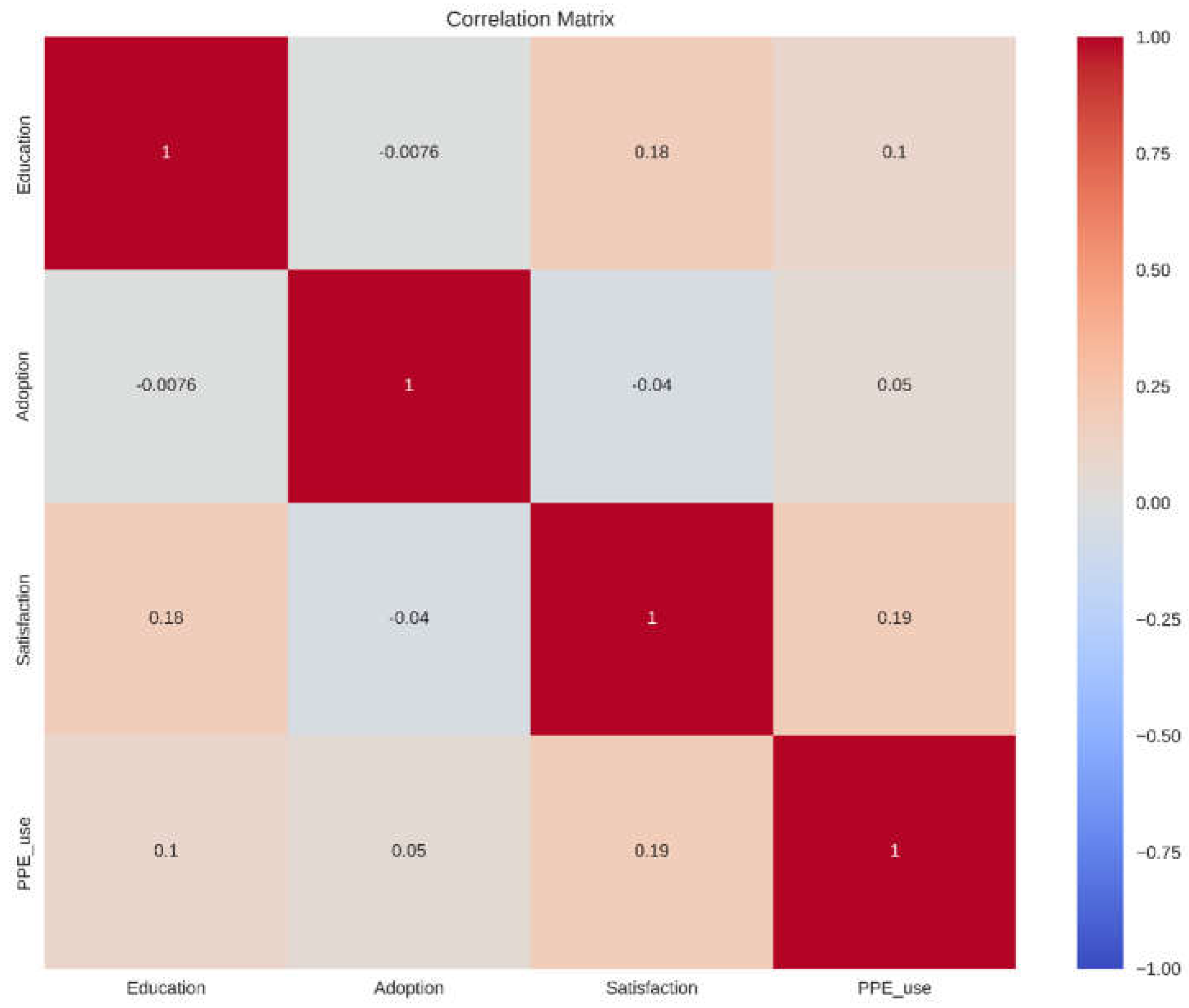Introduction
Climate change and pollution are intrinsically linked, forming the foundation of our current ecological crisis. Since the Industrial Revolution, environmental pollution has become rampant, with both agriculture and industrialization significantly contributing to climate change through greenhouse gas emissions, impacting human health, biodiversity, and the environment (Smith, 2015; Omoyajowo et al., 2024a). The agricultural sector, heavily reliant on fertilizers and pesticides, faces significant challenges due to field contamination and its impact on the food chain (Lee et al., 2020; Omoyajowo et al., 2018). Indiscriminate pesticide use leads to toxic residue accumulation in crops, entering the human food chain and infiltrating ecosystems (Williams et al., 2019; Zhang et al., 2021). Farmers, often untrained and without proper personal protective equipment (PPE), are at high risk of exposure, resulting in health issues such as respiratory problems and chronic conditions (Adesuyi et al., 2018). Comprehensive training and PPE are crucial to safeguard farmers' health and mitigate toxic exposure effects. Field contamination from toxic metals and pesticides is a critical issue in paddy soils, exacerbating environmental pollution. Promoting sustainable agricultural practices and ecological innovations is essential for global food security and environmental sustainability, particularly in rice farming, which feeds over half the global population. Efforts to minimize harmful agricultural practices and soil and water contamination are vital for maintaining ecological balance and natural resources (Otitoloju, 2016; Omoyajowo et al., 2018).
As populations grow, environmental pollution and ecological degradation are expected to worsen. The "Zamfara Lead Poisoning Disaster" in Nigeria exemplifies a case of extreme contamination, with unsafe lead levels from mining activities caused fatalities, particularly among children and animals (Otitoloju, 2016). Exposure to lead and other metals has been linked to neurological disorders and cardiovascular diseases, underscoring the need for education, continuous field monitoring, and stringent regulatory measures (Otitoloju, 2016; Omoyajowo et al., 2018). Toxic metals and pesticides pose significant pollution challenges due to their toxicity, persistence, and accumulation in natural systems. Sustainable agricultural practices, such as integrated pest management, organic farming, and biofertilizers, can significantly reduce harmful residues (Smith, 2015; Jones & Brown, 2018; Lee et al., 2020). Techniques like crop rotation and diversification enhance soil health and reduce toxic metal buildup, improving ecosystem resilience. Advanced monitoring technologies, such as remote sensing and GIS, help identify contaminated areas and target remediation efforts (Williams et al., 2019). Farmer education on safe agrochemical use and disposal is essential to prevent soil and water contamination (Zhang et al., 2021). Strengthening regulatory frameworks and enforcing environmental standards ensure agricultural practices align with food security and sustainability goals.
The agricultural sector in Nigeria, particularly paddy rice farming, faces unprecedented challenges due to environmental contamination and climate change. As the rural economy's backbone, paddy rice farming must balance crop productivity with mitigating contamination by toxic metals and pesticides, which pose significant risks to human health and the environment (Olaoye et al., 2017; Bamire et al., 2019). Ecological innovations offer promising solutions to these issues (Pretty et al., 2018). This study assesses the implementation of ecological innovations among Nigerian paddy rice farmers, focusing on their responses to field contamination and climate risks. Using theoretical models (such as the Health Belief Model) and empirical data, it explores farmers' perceptions, practices, and socio-economic factors influencing sustainable farming adoption (Afolayan & Adebisi-Adelani, 2020). The outcomes will provide insights into the current state of ecological innovation in rice farming and offer recommendations to policymakers for promoting sustainable practices and ensuring farmer health and safety (Adisa, 2011).
Literature Review
Sustainable rice farming in Nigeria, and more broadly across Africa, faces numerous challenges, including limited access to modern agricultural technologies, inadequate infrastructure, and insufficient extension services to educate farmers on best practices. These challenges contribute to the prevalence of field contamination and pollution (Wilfred, 2006; Takeshima et al., 2013). Land degradation, erratic weather patterns due to climate change, and the prevalence of pests and diseases further exacerbate the difficulties in maintaining sustainable practices (Oikeh et al., 2008; Ajala & Gana, 2015). Additionally, financial constraints and the lack of access to credit hinder farmers' ability to invest in sustainable methods, while socio-economic factors, such as poverty and low levels of education, further impede progress (Takeshima & Yamauchi, 2012; Ajala & Gana, 2015). Collectively, these issues contribute to the low adoption of sustainable rice farming practices, affecting both productivity and environmental health.
Globalization and economic liberalization have led to unprecedented levels of production and consumption, increasing pollution and heightening concerns about sustainable green growth (Sarkar, 2013). This shift has prompted both producers and consumers to become more eco-conscious, recognizing the importance of ecological innovation in balancing industrial production and economic growth without compromising environmental health. Ecological innovation refers to the development and implementation of new ideas, practices, products, or technologies that reduce environmental impacts, enhance sustainability, and promote ecosystem health and resilience (Kemp & Pearson, 2007; Carrillo-Hermosilla et al., 2010). In agriculture, these innovations often involve improving resource efficiency, minimizing waste and emissions, and integrating sustainable practices across various sectors (Carrillo-Hermosilla et al., 2010). Specifically, in paddy rice agriculture, ecological innovations are crucial for increasing productivity while minimizing environmental impacts. The adoption of improved fertilizers that release nutrients gradually can reduce nutrient runoff and enhance soil fertility over time. Slow-release and controlled-release fertilizers ensure that nutrients are available to plants when needed, improving crop yields and reducing the environmental footprint of farming practices (Gupta et al., 2019). Additionally, growing improved rice varieties, developed through extensive research and development, exemplifies the intersection of industrial production and environmental sustainability (Sarkar, 2013). These advanced varieties enhance yield, resistance to pests and diseases, and adaptability to varying climatic conditions, thereby conserving vital water resources and reducing the environmental impact of rice farming (Fischer et al., 2012; Omoyajowo et al., 2022a, b).
The responsible use of fertilizers and biopesticides plays a critical role in sustainable paddy rice agriculture. Biopesticides, derived from natural materials, offer an environmentally friendly alternative to synthetic pesticides. They are less toxic, degrade more quickly, and target specific pests, reducing the risk to non-target organisms and human health (Ghorbani et al., 2019). Integrating biopesticides into pest management strategies helps control pest populations while maintaining ecological balance. Improved soil and water management techniques are also essential for sustainable paddy rice farming. Mixed cropping, which involves growing different crops in proximity, enhances soil fertility and reduces the need for chemical inputs (Altieri, 1999). Efficient water management practices, such as alternate wetting and drying (AWD), can reduce water usage, lower methane emissions, and improve water use efficiency in rice fields (Lampayan et al., 2015). However, AWD adoption is often hindered by the need for precise timing and monitoring.
Despite these innovations, rice farming poses several potential occupational hazards. Farmers are often exposed to harmful chemicals from fertilizers and pesticides, leading to health risks such as respiratory problems, skin disorders, and long-term chronic diseases (Zhang et al., 2017). The physical demands of rice farming, including prolonged bending and exposure to waterlogged fields, can result in musculoskeletal injuries and infections. Implementing safety measures, such as using personal protective equipment (PPE), proper training on chemical handling, and adopting safer agricultural practices, is crucial to protect farmers' health and well-being (Adesuyi et al, 2018). Disruptive technologies and innovations are revolutionizing paddy rice agriculture, significantly enhancing productivity, sustainability, and resilience. Precision agriculture employs advanced technologies like GPS, remote sensing, and the Internet of Things (IoT) to manage crop production with high precision. These technologies enable precise application of water, fertilizers, and pesticides, optimizing resource use and minimizing environmental impact (Zhang et al., 2019). Additionally, biotechnology has made significant strides in developing rice varieties with improved resistance to pests, diseases, and environmental stressors through techniques such as genetic engineering and marker-assisted selection (Huang et al., 2014).
Digital farming tools and renewable energy applications further contribute to the modernization of rice farming practices. Mobile apps, drones, and farm management software provide real-time information and monitoring capabilities, enabling farmers to make informed decisions and efficiently manage their crops (Wolfert et al., 2017). Renewable energy sources, such as solar-powered irrigation systems, offer sustainable and cost-effective solutions for water management in paddy fields, reducing greenhouse gas emissions and operational costs (Burney et al., 2010). Drawing on established frameworks from agricultural economics and environmental science, this review examines theoretical perspectives on ecological innovations, including their adoption determinants and impacts on environmental stewardship. It also explores occupational health models that emphasize risk assessment and mitigation strategies for farming communities, highlighting the importance of integrating ecological and occupational health considerations into agricultural policy and practice to foster resilience and sustainability in the face of environmental challenges.
Methodology
Sampling and Data Collection
A semi-structured questionnaire was developed and validated by four peers from the University of Lagos and the Federal University of Otueke, specializing in agriculture, environmental studies, biology, and humanities. This questionnaire was based on systematically gathered literature findings pertinent to the research's key issues and objectives. The peer validation ensured that the questionnaire was robust and capable of accurately capturing the necessary data.
The respondents were primarily rice farmers and household heads aged 18 years and above. Participation in the study was voluntary, and confidentiality was strictly maintained to uphold research integrity. The questionnaire collected demographic information such as age, gender, education, and income. It included questions about the most effective strategies to mitigate paddy field contamination and climate risks (with options provided and the ability to write their own). It also asked if respondents had initiated new or extraordinary efforts to mitigate or circumvent potential contamination and climate risks, if they understood climate change, paddy field contamination, and potentially toxic elements released during rice farming activities. Key terminologies like "climate change" and "field contamination" were translated into local languages (Yoruba, Hausa, Pidgin) to ensure comprehension.
Respondents were asked if they thought they might have been exposed to toxic chemicals due to field contamination, surface runoff chemicals on paddy fields, or dietary exposure to chemicals translocated into plant tissues or rice grains. The questionnaire also inquired about the adoption of several sustainable practices such as alternate wetting and drying, the use of organic matter and biocontrol agents, improved fertilizers, crop diversification, and conservation tillage. Additionally, it asked about the type of occupational health risks they faced, how they addressed work-related injuries or illnesses, their use of personal protective equipment (PPE), and their satisfaction with the results of ecological innovations.
The study was conducted across four predominant rice-producing states and regions in Nigeria, specifically Ekiti, Kwara, Edo, and Ogun. Specific geographical locations assessed were Igbemo Ekiti (Ekiti), Pategi (Kwara), Akeke (Edo), and Isoku (Ogun) and their subdivisions (
Figure 1). Each town offer unique insights into Nigeria's diverse landscapes and cultures. From the lush greenery of Igbemo Ekiti to the historical richness of Pategi town, these areas showcase Nigeria's agricultural diversity and traditional heritage. Akeke town in Edo State provide a glimpse into vibrant local communities deeply rooted in cultural practices, while Isoku in Ogun State is renowned for its scenic beauty and traditional rice farming methods.
Fifty (50) questionnaires were administered using simple random sampling per geographical location. Simple random sampling was chosen to ensure a representative sample of the paddy rice farming population in the selected regions. Simple random sampling provided each farmer an equal chance of being selected, which helps in minimizing sampling bias and enhancing the generalizability of the findings. A total of 200 questionnaires were administered and retrieved, and 192 were considered fit for analysis.
Statistical Data Analysis
The study employed descriptive statistics using tools such as SPSS 28, Excel, and Python to summarize data on adoption rates of ecological innovations and occupational health hazards among Nigerian paddy rice farmers in Ekiti, Kwara, Edo, and Ogun states. Correlation analysis examined relationships between farmers' education, adoption of innovations, satisfaction with outcomes, and use of personal protective equipment. Inferential statistics were used to infer conclusions about the wider farmer population. Logistic regression analysed predictors of satisfaction with safety practices, considering factors like ecological innovation adoption and pesticide exposure. Qualitative analysis provided insights from farmers' perspectives. Overall, these methods elucidated how farmers respond to field contamination and climate risks, emphasizing needs for sustainable practices and enhanced occupational health support.
Results and Discussions
The demographic analysis of the surveyed paddy rice farmers, summarized in
Table 1, provides a comprehensive overview of their age, gender, education, and income distributions. The age data reveals that most of the farmers fall within the 26-35 years and 46-55 years age brackets, accounting for 28.1% and 27.6% of the sample, respectively. This indicates a significant presence of middle-aged individuals in the farming population. Additionally, the gender distribution shows a marked predominance of male farmers, who constitute 71.4% of the respondents, highlighting a substantial gender disparity in the sector.
Educational attainment among the farmers is varied, with the majority having at least elementary education (29.2%). However, higher education levels are less common, with only 8.9% holding a Bachelor of Science or Higher National Diploma and a mere 1.0% possessing a Master's or Doctoral degree. Income levels are predominantly low, with over half of the farmers earning less than N50,000. Only a small fraction of the farmers has incomes exceeding N200,000, underscoring the economic challenges within the sector. These findings emphasize the need for targeted interventions to enhance educational opportunities, promote sustainable farming practices, and improve economic conditions for paddy rice farmers in Nigeria.
Figure 5.
Monthly Income.
Figure 5.
Monthly Income.
Table 2 reveals that among 192 respondents, 32.3% identified implementing regulatory standards as the most effective strategy to mitigate paddy field contamination and climate risks. Close behind, 30.7% favored educating and providing support for farmers, highlighting the importance of knowledge and resources. Improving agricultural practices was chosen by 29.17%, indicating a need for better farming methods. Lastly, promoting the cultivation of resilient crop varieties was the least preferred strategy at 7.8%, suggesting it is considered less impactful compared to the other approaches. Regulatory standards play a crucial role in ensuring compliance with environmental norms and can significantly impact pollution levels and agricultural practices (Naeem et al., 2020). In fact, previous studies show that strict enforcement of regulations can lead to reduced pesticide use and better environmental outcomes (Dabbert et al., 2019). However, Farmer education and support programs are essential for promoting sustainable practices and enhancing resilience to climate risks (Van Meensel et al., 2019). Providing access to knowledge and resources can lead to improved adoption of best practices and technology, thereby reducing environmental impacts (Lamb et al., 2021). Also equally important to note, aadopting improved agricultural practices, such as integrated pest management and precision agriculture, can mitigate pesticide use and minimize environmental contamination, enhancing soil health and water quality for long-term sustainability (Smith et al., 2018; Gomiero et al., 2011). Although promoting resilient crop varieties was the least preferred strategy in your study, it has significant potential in adapting to climate change impacts like drought and pest outbreaks, contributing to food security and sustainable agriculture (Tilman et al., 2019; Lobell et al., 2020). It can be generally deduced improving agricultural practices, implementing strict regulatory standards, education and providing supports for farmers are most effective mitigation measures necessary to effectively combat paddy field contamination and its attendant climate risk.
Table 3 presents data on the adoption of ecological innovation among 192 Nigerian paddy rice farmers to mitigate paddy field contamination and climate risks. The results show that only 29.69% of the farmers have initiated new and/or extraordinary efforts in this regard, while a significant majority, 70.31%, have not adopted such measures. This indicates that ecological innovation is not widely implemented among the farmers, suggesting a potential area for improvement in addressing environmental and climate-related challenges in paddy rice farming. The findings from the study among Nigerian paddy rice farmers reveal significant insights into environmental awareness and perceived exposure to toxic elements. Approximately 58.5% of farmers demonstrate awareness of climate change and contamination risks in paddy fields, indicating a foundational understanding within the community. However, 41.45% lack this awareness, highlighting a need for targeted educational interventions. Regarding perceived exposure to toxic elements, 29.69% of farmers feel at risk, suggesting varying levels of concern about environmental contaminants. This perception can influence farmers' adoption of mitigation strategies. The majority (70.31%) do not perceive such exposure, indicating potential gaps between perceived and actual risks. Addressing these findings through tailored education and risk communication strategies is crucial for promoting sustainable agricultural practices and improving environmental stewardship among paddy rice farmers in Nigeria.
Based on the findings of this study, the low adoption rate underscores the need for substantial improvements in promoting environmental and climate-related practices. Literature supports the critical role of innovation in agriculture for environmental sustainability and climate resilience. For instance, the adoption of ecological innovations, such as integrated pest management and precision agriculture, is essential for reducing pesticide use and minimizing environmental contamination (Smith et al., 2018; Gomiero et al., 2011).
The findings that 58.5% of farmers are aware of climate change and contamination risks, while 41.45% lack such awareness, highlight a need for targeted educational interventions. According to Van Meensel et al. (2019), farmer education and support programs are crucial for promoting sustainable practices and enhancing resilience to climate risks. Enhancing awareness and providing comprehensive training can bridge the knowledge gap and encourage the adoption of sustainable practices.
The perception of exposure to toxic elements varies among farmers, with 29.69% feeling at risk. This perception can significantly influence the adoption of mitigation strategies. Studies show that perceived risk is a crucial factor in motivating behavior change and the implementation of risk management practices (Rogers, 1983). Conversely, the majority (70.31%) do not perceive such exposure, indicating a disconnect between perceived and actual risks. Effective risk communication strategies are needed to align farmers' perceptions with actual environmental hazards (Bostrom, 2003).
Addressing the gaps identified in the study through tailored education, training, and incentives for ecological innovation is vital. Efforts to raise awareness, provide technical support, and facilitate access to resources can overcome barriers such as cost concerns and regulatory uncertainties, promoting wider adoption of innovative practices (Naeem et al., 2020). By addressing these factors, we can foster improved environmental stewardship and resilience in paddy rice farming systems.
Figure 6 indicates varying levels of adoption of innovative and sustainable practices among respondents to minimize chemical inputs, optimize soil nutrients, and maintain water efficiency. Improved fertilizer management and crop diversification were the most widely adopted practices, with 29 respondents emphasizing nutrient optimization and biodiversity. The use of organic matter and biocontrol agents was adopted by 15 respondents, reflecting a commitment to sustainable inputs and pest control. Conservation tillage, aimed at soil preservation, was adopted by 12 respondents, while improved water management practices were used by 10 respondents, indicating a focus on water efficiency. Alternate wetting and drying (AWD) had the lowest adoption rate, with only 3 respondents utilizing this specific irrigation technique whilst precision agriculture was not adopted. Improved fertilizer management and crop diversification rank highest in adoption, reflecting respondents' emphasis on nutrient optimization and biodiversity. Studies by Zhang et al. (2018) highlight the benefits of these practices in enhancing soil fertility and crop yield, promoting sustainable agricultural productivity.
The use of organic matter and biocontrol agents follows closely, indicating a strong commitment to sustainable inputs and pest control. Organic matter, such as compost and manure, improves soil structure, water retention, and nutrient supply (Drinkwater et al., 1998). Biocontrol agents offer an environmentally friendly alternative to chemical pesticides, reducing pest populations without harming beneficial organisms (Gurr et al., 2016).
Conservation tillage is next in adoption, emphasizing its importance for soil preservation. This practice reduces erosion and enhances soil moisture, contributing to long-term soil health and sustainability (Lal, 2015). Similarly, improved water management practices also feature prominently, underscoring the focus on water efficiency. Efficient water use is crucial for sustainable agriculture, particularly in regions facing water scarcity. Techniques such as drip irrigation and rainwater harvesting can significantly improve water use efficiency (Fereres & Soriano, 2007).
Alternate wetting and drying (AWD) rank lowest in adoption, highlighting the challenges in utilizing this specific irrigation technique. Despite its benefits for water savings and reduced methane emissions in rice production, AWD requires precise timing and monitoring, which may hinder its widespread adoption (Lampayan et al., 2015). However, Precision agriculture was not adopted at all, pointing to significant barriers such as cost and technical expertise. Although precision agriculture offers potential benefits in terms of efficiency and productivity, it often requires substantial investment in technology and training (Schimmelpfennig, 2016).
From
Figure 7, Education shows a weak positive correlation with Satisfaction (0.179) and a very weak positive correlation with PPE use (0.100), while having a negligible negative correlation with Adoption (-0.008). Adoption has a very weak positive correlation with PPE use (0.050) and a very weak negative correlation with Satisfaction (-0.040). Satisfaction exhibits a weak positive correlation with PPE use (0.194). Overall, PPE use has weak positive correlations with all other variables. These correlations indicate some relationships among the variables, although they are generally weak, with the strongest correlation being between Satisfaction and PPE use (0.194), suggesting a slight tendency for higher satisfaction to be associated with increased PPE use, or vice versa. Education can lead to higher satisfaction levels by increasing awareness and understanding of best practices and benefits (DeVoe & Pfeffer, 2007; Ng & Feldman, 2009). Previous studies have shown that education improves awareness of health risks and safety practices (Omoyajowo et al, 2024b), which can slightly enhance PPE use (Ferguson et al., 2010). Nonetheless, various factors can the adoption of innovative practices beyond education, such as financial constraints, cultural factors, or access to resources (Rogers, 2003). However, the positive relationship between adoption and PPE use have supported the argument that innovative practices often come with increased awareness and adherence to safety protocols, though this relationship is minimal (McDonald et al., 2002). Whilst adoption of new practices does not necessarily translate to increased satisfaction, potentially due to the challenges and adjustments required (Rogers, 2003), higher satisfaction levels can lead to better adherence to safety protocols, as satisfied individuals are generally more engaged and compliant with recommended practices (Huang et al., 2016). The positive relationship between increased use of PPE and higher satisfaction could indicate that satisfied individuals are more motivated to follow safety guidelines (Huang et al., 2016).
Results showed that out of 84 respondents who have experienced work-related injuries or illness,28% had suffered cuts, abrasion and puncture wounds, about 13% had musculoskeletal injuries, 10% had heat stress, 9 respondents have experienced bite from insects and animals, only 1 respondent had hearing loss and respiratory issues and about 5.7% have experienced chemical poisoning and eye injuries.Leigh et al. (2001) highlights that cuts and punctures are among the most common injuries in these environments, often resulting from handling equipment or accidental contact with sharp objects. According to Punnett and Wegman (2004), musculoskeletal disorders are a significant concern in occupations involving manual labour, contributing to substantial morbidity and work-related disability. Agricultural workers are particularly susceptible due to prolonged exposure to the sun and physical activity. Jackson and Rosenberg (2010) note that heat stress can lead to heat exhaustion, heat stroke, and other heat-related illnesses, emphasizing the importance of adequate hydration and rest breaks. Exposure to wildlife and pests can result in bites and stings, which can sometimes lead to more severe health issues if not promptly treated. Benjamini et al. (2006) discuss the risks associated with insect bites, including allergic reactions and vector-borne diseases. Exposure to loud machinery and dust can lead to hearing loss and respiratory illnesses. Teschke et al. (1999) highlights that chronic exposure to high noise levels and respiratory irritants in the workplace can lead to hearing loss and respiratory problems. Nonetheless, exposure to chemicals can result in poisoning, skin irritation, and eye injuries. Adesuyi et al (2018) underscore the importance of proper handling, storage, and use of personal protective equipment (PPE) to prevent such incidents.
Figure 8.
Injury types experienced by paddy rice farmers (n=84), multiple responses (n=96).
Figure 8.
Injury types experienced by paddy rice farmers (n=84), multiple responses (n=96).
When respondents were asked how they would address work-related injuries or illness, interestingly, 42.7% of the total respondents uses first aid supplies and equipment on the farm to treat minor injuries, while about 20% admitted to seeking medical attention from local healthcare providers or hospitals. About 12% wears protective equipment to prevent injuries or exposure to hazardous substances and, about 7% adopt safe working practices to reduce the risk of injuries or illness.Only few of the respondents (3.1%) attends training and education for farm workers on safety practices and procedures to prevent injuries or illnesses; about 5.2% of the respondents take conscious effort at regularly maintaining and inspecting farm equipment and machinery to ensure proper functioning and safety.Also, about 3.1% of the respondents try to reduce the use of pesticides and chemical fertilizer by adopting organic and natural farming methods, 5.2% of the respondents implement methods to reduce risks and only 1% of respondents seek support from local agricultural organizations or government agencies to address safety and health concerns on the farm.
The most common approach, that respondent chose is utilizing first aid supplies and equipment. This will be a valuable tool to treat minor injuries or even manage more critical ones before receiving medical treatment. Having first aid kits readily available and accessible is crucial in managing minor injuries and preventing complications (Miller and Singo, 2020). Studies by Hsieh et al. (2018) highlight the role of healthcare services in managing occupational injuries and emphasize the need for accessible medical care for agricultural workers. More importantly to note, is that respondents in this study would rather prefer to opt for first aid rather than seeking appropriate medical care, this behaviour might be developed when cost of medical care is high and not affordable. The use of protective equipment, (PPE) is a preventive measure against injuries and hazardous substance exposure and the fact that only few people rather than the majority choosing it reflects that more education on PPE should be provided to farmers. This is because the efficacy of personal protective equipment (PPE) in reducing work-related injuries is well-documented. A recent study by Huang et al. (2021) confirms that wearing appropriate PPE significantly decreases the risk of injuries and illnesses in agricultural settings. More so, Safe working practices, such as proper handling techniques and adherence to safety protocols, are critical in reducing workplace hazards. A study by Salvatore et al. (2019) emphasizes that training workers in safe practices can substantially reduce injury rates. Findings by Strong et al. (2020) indicates that continuous safety training significantly improves workers' ability to recognize and avoid hazards. Whilst a study by Schenker et al. (2017) shows that systematic equipment maintenance reduces the incidence of machinery-related injuries. Literature by Gomiero et al. (2018) supports the benefits of organic farming in minimizing health risks and enhancing ecological balance because of great reductions in pesticides, and chemical fertilisers’ usage. The study by Hofmann et al. (2019) highlights the effectiveness of risk management techniques in creating safer work environments. Research by Leigh et al. (2018) emphasizes the role of government programs and agricultural organizations in promoting farm safety and providing necessary support.
Figure 9.
Measures and steps that farmers took to address injuries and illness after exposure to occupational health hazard values are expressed in %, (n = 96, multiple responses allowed).
Figure 9.
Measures and steps that farmers took to address injuries and illness after exposure to occupational health hazard values are expressed in %, (n = 96, multiple responses allowed).
The intercept represents the log odds of the event when all predictors are zero. In this case, the odds ratio is 0.007, indicating a very low odds of the event (dependent variable) occurring. The model appears to fit the data well, as indicated by goodness-of-fit statistics (67.4% (Nagelkerke R2) and 46.9% (Cox and Snell R2) variations in the dependent variable). Also, the null hypothesis for the Hosmer-Lemeshow test is that the model fits well. This shows that the logistic regression model is appropriate for explaining the relationship between the dependent and the independent variables. The respondents’ who have adopted ecological innovations or sustainable farming techniques expressed higher satisfaction with such practices (β = 2.452, χ2 = 20.891; p < 0.05). This aligns with findings from Pretty et al. (2006), who noted that sustainable agricultural practices often lead to improved economic, environmental, and social outcomes, thereby enhancing farmer satisfaction. Respondentswho adopted ecological innovations or sustainable farming techniques are 11.613 times more likely to be satisfied with such effort. Similarly, the respondents’ exposure level to pesticides and chemicals positively influenced their satisfaction on the implementation of safety practices on the farm (β = 1.407, χ2 = 5.882; p < 0.05). The result indicates that respondents who have had prior exposure to pesticides and chemicals are 4.084 times more likely to be satisfied with the result of implementing. This finding is supported by literature indicating that individuals with prior exposure to occupational hazards are more appreciative of and compliant with safety interventions (Mekonnen & Agonafir, 2002).
The
Table 4c below shows us that the estimated model is now:
logit (Satisfaction adopting safety practices) = -4.930 + 1.649*Farmers’ environmental awareness + 1.407*Farmers exposure level + 2.452* Adoption of Ecological Innovation
Table 4a.
Model Summary for the relationship between adopted ecological innovations or sustainable farming techniques expressed higher satisfaction.
Table 4a.
Model Summary for the relationship between adopted ecological innovations or sustainable farming techniques expressed higher satisfaction.
| Model Summary |
| Step |
-2 Log likelihood |
Cox & Snell R Square |
Nagelkerke R Square |
| 1 |
106.783a |
.469 |
.674 |
| a. Estimation terminated at iteration number 7 because parameter estimates changed by less than .001. |
Table 4b.
Ecological innovations against satisfaction: Hosmer and Lemeshow Test.
Table 4b.
Ecological innovations against satisfaction: Hosmer and Lemeshow Test.
| Hosmer and Lemeshow Test |
| Step |
Chi-square |
df |
Sig. |
| 1 |
10.739 |
5 |
.057 |
Table 4c.
relationship between adopted farmers; environmental awareness, adoption of ecological innovation, farmers’ exposure to toxic chemicals.
Table 4c.
relationship between adopted farmers; environmental awareness, adoption of ecological innovation, farmers’ exposure to toxic chemicals.
| Predictor |
β |
SE |
Wald (χ2) |
P value |
Exp (β) |
| Intercept |
-4.930 |
.902 |
29.888 |
.000 |
.007 |
| Farmers’ environmental awareness |
1.649 |
.851 |
3.752 |
.053 |
5.200 |
| Farmers’ exposure* |
1.407 |
.580 |
5.882 |
.015 |
4.084 |
| Adoption of Ecological Innovation |
2.452 |
.536 |
20.891 |
.000 |
11.613 |
Conclusion
The study highlights the critical issue of field contamination and its impact on Nigerian paddy rice farmers. The key findings indicate that only 29.69% of farmers have adopted ecological innovations, demonstrating a low uptake of sustainable practices. The study also reveals that most farmers are aware of climate change and contamination risks but lack the necessary resources and support to implement effective mitigation strategies. Additionally, the research underscores the significant health risks faced by farmers due to exposure to toxic chemicals, with common injuries including cuts, abrasions, and musculoskeletal issues.The findings address the research questions by showing the current state of ecological innovation adoption and identifying the socio-economic and educational factors influencing this adoption. The study confirms that educational interventions and regulatory measures are essential to enhance the adoption of sustainable practices.
Specific Recommendations:
Future Research:
Future research should focus on conducting in-depth studies to identify and understand the various barriers to the adoption of ecological innovations among farmers. These barriers may include financial constraints, which involve assessing the economic challenges that farmers face when adopting new technologies and practices. Additionally, the availability and accessibility of information on sustainable practices and innovations need to be evaluated to determine how effectively farmers can obtain the knowledge they need. Cultural factors also play a significant role, so exploring cultural attitudes and beliefs that may influence farmers' willingness to adopt new methods is crucial. Proposing longitudinal research to track the long-term impacts of sustainable agricultural practices is essential. This research should monitor farmer health over time to assess the effectiveness of interventions in reducing exposure to toxic chemicals and related health issues. It should also evaluate the impact of sustainable practices on crop yields and overall farm productivity, providing valuable data to support the economic viability of these methods. Furthermore, investigating the effectiveness of policy measures and regulatory frameworks in promoting sustainable practices is necessary. This could include studies on the enforcement of pesticide regulations and the provision of subsidies for eco-friendly inputs. By understanding these dynamics, future research can offer comprehensive insights into the factors that facilitate or hinder the adoption of sustainable agricultural practices, thereby informing more effective policies and interventions.
Acknowledgments
The authors express gratitude to Dr. Victor Sobanke, Ms. Iyadunni Omoyajowo, Prince Debo Adewumi, Mr. Akindele Akinboboye, Bukola Adebisi, Ms. Damilola Oni, and many volunteers who contributed immensely to this project, part of a broader study on "Assessment of toxic metals and organochlorine pesticide residues in Nigerian rice fields: Exploring sustainable agricultural practices and climate vulnerability risks”.
References
- Adesuyi, A. A., Longinus, N. K., Olatunde, A. M., & Chinedu, N. V. Pesticides related knowledge, attitude and safety practices among small-scale vegetable farmers in lagoon wetlands, Lagos, Nigeria. Journal of Agriculture and Environment for International Development (JAEID) 2018, 112(1), 81-99.
- Adisa, R. S. Management of farm-related conflict in southwestern Nigeria: Implications for agricultural extension. The Journal of Agricultural Education and Extension 2011, 17(4), 325-339.
- Afolayan, S. O., & Adebisi-Adelani, O. Adoption of improved rice varieties by farmers in Ekiti State, Nigeria. Nigerian Journal of Rural Sociology 2020, 20(1), 21-26.
- Ajala, S., & Gana, A. Analysis of challenges facing rice processing in Nigeria. Journal of Food Processing 2015, 2015(8), 1-6. [CrossRef]
- Ajzen, I. The theory of planned behavior. Organizational Behavior and Human Decision Processes 1991, 50(2), 179-211.
- Altieri, M. A. The ecological role of biodiversity in agroecosystems. Agriculture, Ecosystems & Environment 1999, 74(1-3), 19-31. [CrossRef]
- Bamire, A. S., Sanusi, W. A., & Ayinde, I. A. Determinants of adoption of sustainable agriculture technologies by smallholder farmers in Nigeria. Journal of Development and Agricultural Economics 2019, 11(3), 77-85.
- Benjamini, Z., Gerson, U., & Litmanovich, M. Insect and animal bite allergies. Pediatric Allergy and Immunology 2006, 17(4), 331-335.
- Bostrom, A. Future risk communication. Futures 2003, 35(6), 539-557. [CrossRef]
- Burney, J. A., Woltering, L., Burke, M., Naylor, R. L., & Pasternak, D. Solar-powered drip irrigation enhances food security in the Sudano-Sahel. Proceedings of the National Academy of Sciences 2010, 107(5), 1848-1853. [CrossRef]
- Carrillo-Hermosilla, J., del Río, P., & Könnölä, T. Diversity of eco-innovations: Reflections from selected case studies. Journal of Cleaner Production 2010, 18(10-11), 1073-1083. [CrossRef]
- Dabbert, S., Häring, A. M., & Zanoli, R. (Eds.). Regulation of pesticide use in organic farming: An international perspective. CABI, 2019.
- DeVoe, S. E., & Pfeffer, J. When is happiness about how much you earn? The effect of hourly payment on the money-happiness connection. Personality and Social Psychology Bulletin 2007, 33(12), 1604-1618. [CrossRef]
- Drinkwater, L. E., Wagoner, P., & Sarrantonio, M. Legume-based cropping systems have reduced carbon and nitrogen losses. Nature 1998, 396(6708), 262-265. [CrossRef]
- Farinmade, A. E., Ogunyebi, A. L., Omoyajowo, K. O. Studying the effect of cement dust on photosynthetic pigments of plants on the example Ewekoro cement industry, Nigeria. Technogenic and ecological safety 2019, 5(1/2019), 22–30. [CrossRef]
- Fereres, E., & Soriano, M. A. Deficit irrigation for reducing agricultural water use. Journal of Experimental Botany 2007, 58(2), 147-159. [CrossRef]
- Ferguson, E., James, D., & Madeley, L. Factors associated with success in medical school: Systematic review of the literature. BMJ 2010, 340, c114. [CrossRef]
- Fischer, R. A., Byerlee, D., & Edmeades, G. O. Crop yields and global food security: Will yield increase continue to feed the world? Australian Centre for International Agricultural Research, 2012.
- Ghorbani, R., Wilcockson, S., Koocheki, A., & Leifert, C. Soil management for sustainable agriculture. Sustainability 2019, 11(18), 5029.
- Gomiero, T., Pimentel, D., & Paoletti, M. G. Environmental impact of different agricultural management practices: Conventional vs. organic agriculture. Critical Reviews in Plant Sciences 2011, 30(1-2), 95-124. [CrossRef]
- Gomiero, T., Pimentel, D., & Paoletti, M. G. Environmental impact of different agricultural management practices: conventional vs. organic agriculture. Critical Reviews in Plant Sciences 2018, 37(1), 1-35. [CrossRef]
- Gupta, R., Lal, R., & Shepherd, D. The role of controlled-release fertilizers in improving nutrient use efficiency and mitigating environmental impact. Sustainable Agriculture Reviews 2019, 36, 215-235.
- Gurr, G. M., Wratten, S. D., & Luna, J. M. Multi-function agricultural biodiversity: Pest management and other benefits. Basic and Applied Ecology 2016, 7(2), 107-116. [CrossRef]
- Hofmann, J. N., Hines, C. J., & Fenske, R. A. Implementing risk reduction strategies for occupational exposures in agriculture. Journal of Occupational Health 2019, 61(4), 273-282.
- Hosmer, D. W., Lemeshow, S., & Sturdivant, R. X. Applied Logistic Regression (3rd ed.). John Wiley & Sons, 2013.
- Hsieh, H. F., Apostolopoulos, Y., & Sönmez, S. Occupational health disparities among immigrant workers: a qualitative study of Hispanic farmworkers. Workplace Health & Safety 2018, 66(6), 274-282.
- Huang, J., Hu, R., Rozelle, S., Qiao, F., & Pray, C. Genetically modified rice, yields, and pesticides: Assessing farm-level productivity effects in China. Economic Development and Cultural Change 2014, 52(2), 291-312.
- Huang, Y. H., Lee, J., McFadden, A. C., Murphy, L. A., Robertson, M. M., Cheung, J. H., & Zohar, D. Beyond safety outcomes: An investigation of the impact of safety climate on job satisfaction, employee engagement, and turnover using social exchange theory as the theoretical framework. Applied Ergonomics 2016, 55, 248-257. [CrossRef]
- Jackson, L. L., & Rosenberg, H. R. Preventing heat-related illness among agricultural workers. Journal of Agromedicine 2010, 15(3), 200-215. [CrossRef]
- Jones, R., & Brown, T. Greenhouse gas emissions and their effects on global health. Journal of Environmental Health 2018, 45(4), 456-470.
- Kamilaris, A., Kartakoullis, A., & Prenafeta-Boldú, F. X. A review on the practice of big data analysis in agriculture. Computers and Electronics in Agriculture 2018, 143, 23-37. [CrossRef]
- Kemp, R., & Pearson, P. Final report MEI project about measuring eco-innovation. UM Merit, Maastricht, 2007.
- Kindon, S., Pain, R., & Kesby, M. Participatory action research approaches and methods: Connecting people, participation and place. Routledge, 2007.
- Lal, R. Soil conservation and ecosystem services. International Soil and Water Conservation Research 2015, 3(2), 61-69.
- Lamb, A., Green, R., Bateman, I., Broadmeadow, M., Bruce, T., Burney, J.,... & McCracken, D. The potential for land sparing to offset greenhouse gas emissions from agriculture. Nature Climate Change 2021, 11(1), 1-7. [CrossRef]
- Lampayan, R. M., Rejesus, R. M., Singleton, G. R., & Bouman, B. A. M. Adoption and economics of alternate wetting and drying water management for irrigated lowland rice. Field Crops Research 2015, 170, 95-108. [CrossRef]
- Lee, M., Kim, H., & Park, J. Agricultural practices and field contamination: A review.Agriculture and Environment Research 2020, 52(1), 78-92.
- Leigh, J. P., Du, J., & McCurdy, S. A. Costs of occupational injuries and illnesses in agriculture. Public Health Reports 2018, 132(1), 55-64.
- Leigh, J. P., Markowitz, S. B., Fahs, M., Shin, C., & Landrigan, P. J. Occupational injury and illness in the United States: Estimates of costs, morbidity, and mortality. Archives of Internal Medicine 2001, 157(14), 1557-1568.
- Lobell, D. B., Schlenker, W., & Costa-Roberts, J. Climate trends and global crop production since 1980. Science 2011, 333(6042), 616-620. [CrossRef]
- McDonald, S., Thyne, M., McDormand, J., & Gibb, J. Social influences on rebuy intentions of low involvement products: Relationships between positive and negative word-of-mouth and customer satisfaction. Australian Marketing Journal (AMJ) 2002, 10(1), 42-52.
- Mekonnen, Y., & Agonafir, T. Pesticide sprayers' knowledge, attitude and practice of pesticide use on agricultural farms of Ethiopia. Occupational Medicine 2002, 52(6), 311-315. [CrossRef]
- Miller, K., & Singo, P. The importance of first aid training in agricultural settings. Agricultural Safety and Health 2020, 11(3), 210-223.
- Naeem, M., Ahmed, W., Qasim, M., Khushnood, R. A., & Tariq, M. S. Pesticide management: Importance of regulatory authorities, enforcement of laws, and farmers' education. Environmental Science and Pollution Research 2020, 27(12), 13575-13585.
- Nagelkerke, N. J. A note on a general definition of the coefficient of determination. Biometrika 1991, 78(3), 691-692.
- Ng, T. W., & Feldman, D. C. How broadly does education contribute to job performance? Personnel Psychology 2009, 62(1), 89-134.
- Oikeh, S. O., Nwilene, F. E., Diatta, S., Osiname, O. A., & Toure, A. Rice sector development in sub-Saharan Africa. Journal of the Science of Food and Agriculture 2008, 88(7), 1380-1383.
- Oladele, O. I., & Monkhei, M. The impact of agricultural extension services on the adoption of integrated pest management practices among small scale farmers in Botswana. Journal of Agricultural & Food Information 2008, 9(3), 185-195.
- Olaoye, J. O., Adegboye, M. A., & Adigun, Y. J. Assessment of ecological innovation strategies among rice farmers in Nigeria. Nigerian Journal of Technological Development 2017, 14(2), 45-52.
- Omoyajowo, K. O., Adesuyi, A. A., Omoyajowo, K. A., Odipe, O. E., & Ogunyebi, L. A. Strategies to reduce pesticide residues in food: Remarks on pesticide food poisoning scenarios in Nigeria (1958-2018). Journal of Agricultural Sciences, Belgrade 2022, 67(2), 105-125. [CrossRef]
- Omoyajowo, K. O., Adewunmi, M. A., Omoyajowo, K. A., Ogunyebi, A. L., Njoku, K. L., Makengo, B. M.... Ojo-Emmanuel, G. Transitioning to a Сlimate-Resilient Society: Empirical Evidence on What Drives the Adoption of Green Computing Policies in Nigerian Organisations. Trends in Ecological and Indoor Environmental Engineering 2024, 2(1), 28-34. [CrossRef]
- Omoyajowo, K. O., Amiolemen, S., Makengo, B. M., & Ogunyebi, A. Impact of COVID-19 pandemic on single-use plastics in some American firms: Policy insights. Ecological Safety and Balanced Use of Resources 2022, 2(24), 7-12. [CrossRef]
- Omoyajowo, K. O., Danjin, M., Omoyajowo, K., Odipe, O., Mwadi, B., & May, A., et al. Exploring the interplay of environmental conservation within spirituality and multicultural perspective: Insights from a cross-sectional study. Environment, Development and Sustainability 2023, 1-29.
- Omoyajowo, K. O., Njoku, K. L., Babalola, O. O., & Adenekan, O. A. Nutritional composition and heavy metal content of selected fruits in Nigeria. Journal of Agriculture and Environment for International Development (JAEID) 2017, 111(1), 123–139. [CrossRef]
- Omoyajowo, K. O., Omoyajowo, K. A., Bakare, T. I., Ogunyebi, A. L., & Ukoh, S. Reflections on the nexus between climate change, food security and violent conflicts: A tour through the Nigeria experience. Ecological Safety & Balanced Use of Resources 2022, 25(1).22-30. [CrossRef]
- Omoyajowo, K., Agbaogun, B., Ogunyebi, A., Kanaan, M., Omoyajowo, B., Makengo, B. M., Alayemi, A., Omoyajowo, K., & Alao, R. Is bisphenol A (BPA) a public health concern? A cross-sectional study of public knowledge, attitude and risk perception in southwestern part of Nigeria. FUDMA Journal of Sciences (FJS) 2024, 8(2), 364-372. Federal University Dutsin-Ma. [CrossRef]
- Pretty, J., Benton, T. G., Bharucha, Z. P., Dicks, L. V., Flora, C. B., & Godfray, H. C. J. Global assessment of agricultural system redesign for sustainable intensification. Nature Sustainability 2018, 1(8), 441-446. [CrossRef]
- Pretty, J., Noble, A. D., Bossio, D., Dixon, J., Hine, R. E., Penning de Vries, F. W., & Morison, J. I. Resource-conserving agriculture increases yields in developing countries. Environmental Science & Technology 2006, 40(4), 1114-1119. [CrossRef]
- Punnett, L., & Wegman, D. H. Work-related musculoskeletal disorders: The epidemiologic evidence and the debate. Journal of Electromyography and Kinesiology 2004, 14(1), 13-23. [CrossRef]
- Rogers, E. M. Diffusion of innovations (5th ed.). Free Press. 2003.
- Rogers, R. W. Cognitive and physiological processes in fear appeals and attitude change: A revised theory of protection motivation. Social Psychophysiology: A Sourcebook 1983, 153-176.
- Rosenstock, I. M. Historical origins of the health belief model. Health Education Monographs 1974, 2(4), 328-335. [CrossRef]
- Salvatore, A. L., McCauley, L. A., & Rullan, J. V. Effective strategies for agricultural worker safety and health. Journal of Agromedicine 2019, 24(2), 132-145.
- Sarkar, A. N. Promoting eco-innovations to leverage sustainable development of eco-industry and green growth. European Journal of Sustainable Development 2013, 2(1), 171-224. [CrossRef]
- Schenker, M. B., McCurdy, S. A., & Riden, H. E. Agricultural safety and health: A growing concern. Annual Review of Public Health 2017, 38, 37-52.
- Schimmelpfennig, D. Farm profits and adoption of precision agriculture. Economic Research Service, U.S. Department of Agriculture, 2016.
- Slovic, P. The perception of risk. Earthscan Publications, 2000.
- Smith, J. The impact of the Industrial Revolution on the environment. Environmental Science Journal 2015, 34(2), 123-135.
- Smith, R. G., Gross, K. L., & Robertson, G. P. Effects of crop diversity on agroecosystem function: Crop yield response. Ecosystem Health and Sustainability 2018, 4(1), 24-35. [CrossRef]
- Smith, R. G., Gross, K. L., & Robertson, G. P. Effects of crop diversity on agroecosystem function: Crop yield response. Ecosystem Health and Sustainability 2018, 4(1), 24-35. [CrossRef]
- Strong, L. L., & Thompson, B. Safety training and injury prevention in agriculture: Evidence from Hispanic farmworkers. Safety Science 2020, 124, 104584.
- Takeshima, H., & Yamauchi, F. Risks and farmers' investment in productive assets in Nigeria. Agricultural Economics 2012, 43(2), 143-153. [CrossRef]
- Takeshima, H., Edeh, H., Lawal, A., & Isiaka, M. A. Characteristics of private-sector tractor service provisions: Insights from Nigeria. Developing Economies 2013, 51(4), 333-361.
- Teschke, K., Kennedy, S. M., & Olshan, A. F. Effect of different exposure assessment methods on risk estimates in a community-based case-control study. Scandinavian Journal of Work, Environment & Health 1999, 25(5), 380-387.
- Tian, F. An agri-food supply chain traceability system for China based on RFID & blockchain technology. Proceedings of the 13th International Conference on Service Systems and Service Management (ICSSSM), 2016; 1-6.
- Tilman, D., Balzer, C., Hill, J., & Befort, B. L. Global food demand and the sustainable intensification of agriculture. Proceedings of the National Academy of Sciences 2011, 108(50), 20260-20264. [CrossRef]
- Van Meensel, J., Lauwers, L., Van Huylenbroeck, G., & Van Passel, S. Farmers' motives for adopting conservation agriculture practices in Europe: A review. Agricultural Systems 2019, 172, 88-96.
- Wilfred, O. R. Final survey report on the status of rice production, processing, and marketing in Uganda. Japan International Cooperation Agency, Osaka, Japan, 2006.
- Williams, K., Adams, L., & Clark, S. Pesticide residues in food and associated health risks. Food Safety Journal 2019, 39(3), 210-224.
- Wolfert, S., Ge, L., Verdouw, C., & Bogaardt, M. J. Big data in smart farming–a review. Agricultural Systems 2017, 153, 69-80.
- Zhang, Q., Liu, Y., & Wang, S. Ecological impact of toxic element accumulation in agriculture. Ecological Studies 2021, 58(3), 310-325.
- Zhang, X., Davidson, E. A., Mauzerall, D. L., Searchinger, T. D., Dumas, P., & Shen, Y. Managing nitrogen for sustainable development. Nature 2018, 564(7735), 386-396. [CrossRef]
- Zhang, X., Wu, B., Xu, Z., Xu, X., Chen, Y., & Li, S. Pesticide poisoning among agricultural workers in China: The current situation and challenges. Environmental Health Perspectives 2017, 125(4), 469-476.
- Zhang, Y., Wang, Y., Wang, X., Zhang, X., & Liu, Z. Precision agriculture–A worldwide overview. Sensors 2019, 19(23), 5511.
|
Disclaimer/Publisher’s Note: The statements, opinions and data contained in all publications are solely those of the individual author(s) and contributor(s) and not of MDPI and/or the editor(s). MDPI and/or the editor(s) disclaim responsibility for any injury to people or property resulting from any ideas, methods, instructions or products referred to in the content. |
© 2024 by the authors. Licensee MDPI, Basel, Switzerland. This article is an open access article distributed under the terms and conditions of the Creative Commons Attribution (CC BY) license (http://creativecommons.org/licenses/by/4.0/).
